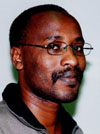Motoshi Suzuki (Japan)
Graduate student, Holistic Education, International University, Kyoto
Many, perhaps most, college students today are irresponsible, self-centered and selfish, and the saddest part of all is that because of these attitudes they are not really happy. They feel ill-at-ease. They know that something is missing from their lives. This great search for personal freedom without responsibility
gives rise to another problem.
Adults are looking for their own freedoms while children are looking for different kinds of freedoms and because of this two worlds are being created. We should be working toward
a unified society that, along with freedom, includes both adult and student responsibilities. In actuality, there is a great division being formed between the young and the mature. And this is unfortunate for everyone."
Ayelet Meir (Israel) Tom Ondicho (Kenya)
Charles Robinson (Australia) Hamed Abdel-Samad (Egypt)
Andy Natusch (U.S.A.)
Omido Vafa (Canada)
Veri Farina (Venezuela)
Crystal Barnard (U.S.A.)
Ramona Fieru (Romania) We know that the challenges of internationalism and globalism are real and will simultaneously be affected by domestic changes, national events and choices. We know that national and geographical differences will continue to function as critical filters for the
pervasiveness of global forces. Moreover, we are conscious of the fact that the future of humanity will continuously transform until to the formation of a unique planetary nation. We hope that the ideology of democracy, of majority rule, is changing into a civil society of human rights and neo-natural rights. We must better understand the real necessities and
regularities of life. We should establish a system of education based on the cult of peace, human values, creation and work, humanism and justice.
Paulo Chaves (Brazil) From these basic facts we can tell that something is going wrong. Man has started to suffer from his own attitudes against nature and even the ways societies are organized. This has caused harm to our existence.
The problems are uncountable, from mutual disrespect to nuclear weapons. Nevertheless, the year 2000 can come not as a cabalistic solution, but as a moment when everybody can stop to think not only about the Y2K bug and Nostradamus' prophecies but in a real sustainable way to activate a harmonious existence.
SeoYong Lee (Korea) In a sense, the term "globalisation" seems to have meant "Westernisation" during the last 100 years, especially in many Asian countries. As a result, Asian countries have certainly got many benefits from Western technologies and their capitalism. But at the same time, they lost many of their own cultures and sometimes, their confidence in their identities. Now it is necessary for youth to pull themselves out of their own narrow world and to try to find alternatives on the right way of globalisation.
Seiko Nishida (Japan)
Connie M. Hansen (Denmark)
Maguelonne Billy (France) My main concern is about "educating" people, to make them realise that they all can live in harmony on the same planet even if they all are
different. It is not worth fighting for a piece of land or for a god. Maybe peace is the most important goal we have to achieve. Then peace, and also political stability, would be the key to all the problems.
Rossitza Ivanova (Bulgaria) Petrus Ari Santoso (Indonesia) Bryan Nykon (Canada) Regardless of how polluted and complex the world has become, it is our piece of clay. We have to sculpt it as we see fit. I do not believe that leaving this duty to conservative bureaucrats or CEO's of multinational corporations is an option, doing so would surely lead to even more severe problems. The sculpture that we have to make requires creativity,
open-mindedness and a sense of responsibility not only to our pocketbooks but more importantly to all of humanity.
To start, we have to make a diligent effort for worldwide peace and prosperity. This presupposes basic needs for all, just one of the many immediate issues. Perhaps our greatest challenge will be organizing and maintaining worldwide co-operation, a necessity in our new 'global community'. I personally do not know how to do this, perhaps some sort of spiritual reformation is required. Needless to say, change is always difficult, but if we accept the fact that it is inevitable and prepare ourselves for it, we can make it a little easier.
Sigrid Vivo Guzman (Spain) Throughout history, humanity has focused on a gradually and continuing "evolution" consigning the cost it represents to oblivion. The cost of progress has always been submitted to its economical and political successes. Now the 21st century opens to us with patterns such as "globalization" which imply a new perspective of life in a worldwide process that involves all the cultures and sciences as a whole. Such achievements arise joined with a "pandoras box" that has never been opened before, containing a deadline to balance progress, market and profit with natural resourves and ethics, where paradox has no place.
Here's the situation: we still have a balance, but it is now that we have to keep it without falling into the easy fallacy that progress is threatening the future or that progress has to be assumed with all the consequences.
student of Tao Shiatsu in Kyoto

When we hear about a conflict in a remote part of the world we tend to say "Oh, why can't they stop killing each other and live together in peace?" But when faced with the problems of our own country or region, all of a sudden we say, "It's not so black and white, there are all these factors to be considered." But if we try to see the global as personal, more in attitude than in action, things might finally change. Whether it's an ecological or political problem, whether it's outside our door, or halfway across the world, we need to look into ourselves first, see how we perceive ourselves and our role in all of this. When everything becomes personal mass media and system manipulation works less and this might bring a profound change.
Anthropology Student, University of Nairobi / Kyoto University

When I first heard about the "Youth at the Millennium" symposium, I tried to list down the challenges facing the youth around the globe today. Then I was shocked on how big the list had grown. Among others in my list were unemployment, illiteracy, AIDS, substance and drug abuse, hunger, poverty, violence, lack of adequate health care and shelter etc. These are global challenges too. The "Youth at the Millennium" symposium presents us, the youth of the world, a rare opportunity to come together to share notes, experiences and opinions, exchange ideas and views, learn from each other, and make suggestions on the way forward. My wish is to see the youth play a more leading role in society in the next millennium. My desire is to see the "global village" become a better place for us all to live in peace, love and harmony. My challenge to the youth is: let us all work together for 'united we stand and divided we fall', let us make our voices heard, our presence felt and let our actions speak for us, for actions speak louder than words'. See you at the symposium and let us talk.
Political Science/Japanese Studies, Kwansei Gakuin

Ever slowly the gap between the various generations is closing and the time that we can stand as one is getting closer. To be able to understand someone else and their opinions is the first step to creating a truly global community and to begin to be able to solve all conflicts
and disagreements peacefully. The future is for everyone, not just the privileged few and to make this a reality cooperation and understanding is essential. I want to live in a world where freedom is the norm and all societies are unified. We must realise that we are not just responsible for ourselves but everyone else around us.
Political Science, Kwansei Gakuin

Modernity was like a train that used to stop at certain stations where people were waiting on the platform. Some people were able to decide to
ride the train and some just preferred to keep waiting. Today everything has
changed. There are no stations and no platforms any more. Everybody
seems to live on the rails of the crazy train. You ride or you'll be
smashed!!
In the past human beings used to be responsible for their fate. Today
they seem to have put a great part of their power in the hands of
technology and machines. These machines are now able to develop their
own mechanisms, so that they could be independent from human beings'
expectations.
The prophets of Globalization predict it is coming like a flood and no
dams can stop it. Fundamentalism and nationalism are growing as weapons
against "modernity". Weapons' technology is beyond imagination. Any
country has the ability to have or even use the atomic bomb. Peace
makers and war makers are one and the same. Consumption is the backbone
of today's economy. Raping the environment is the only way to keep the
wheel of economy in motion. How the future will look like, I have no
clue. There are enough reasons to be scared, but I am not. I am even
optimistic, but I also know optimism alone is not enough. My only hope
is to be able to lead my own life, not to jump in a speedy train that does
not take me home and seems to go nowhere.
International Business/Multidisciplinary Studies, Kwansei Gakuin

In my country I have seen many different faces and many different races. And I have seen how ignorance on all sides can cause these differences to be reason for things such as hate and distrust and as well cause most of our social problems. I believe through opening minds and freeing ourselves of our presumptions we can learn more about the world around us, far past our countries borders. I think that most of the problems in today's global society stem from our own unique cultures and differences, and how easily we misunderstand each other.
Through understanding, respect, and appreciation of our differences, only then can we conquer our global issues and come to solutions together.
International Law, Kyoto University
 Global Problems are increasing rapidly, the challenge of searching for peace
is unmistakable: we need to reiterate our insight and conviction that every
effort must be made to reduce overt violence in the coming decades and to
redirect our energy to constructive purposes of the human community.
Soon the world will leave behind the 20th century and get ready for the next
millennium. Hopefully the new millennium can become a century of peace and
justice unlike the one we have lived through. Wars are constructed in the
minds of people, and therefore we need to evolve a new culture of peace.
All governments and civil society must shed this concept of war and move
along the road to peace instead of spending huge sum of money on arms and
preparations for war. We must create and build "National Peace Academies"
everywhere and develop many peace soldiers who will carry the message of Peace,
Love, and Good Neighborliness. It is all about Human Security, not National
Security that we need to focus on in the coming future.
Global Problems are increasing rapidly, the challenge of searching for peace
is unmistakable: we need to reiterate our insight and conviction that every
effort must be made to reduce overt violence in the coming decades and to
redirect our energy to constructive purposes of the human community.
Soon the world will leave behind the 20th century and get ready for the next
millennium. Hopefully the new millennium can become a century of peace and
justice unlike the one we have lived through. Wars are constructed in the
minds of people, and therefore we need to evolve a new culture of peace.
All governments and civil society must shed this concept of war and move
along the road to peace instead of spending huge sum of money on arms and
preparations for war. We must create and build "National Peace Academies"
everywhere and develop many peace soldiers who will carry the message of Peace,
Love, and Good Neighborliness. It is all about Human Security, not National
Security that we need to focus on in the coming future.
Faculty of Education, Kyoto University

When the topic of indigenous minorities is studied, an educative model is generally proposed to help indigenous groups integrate into mainstream society. The goal of this model is to help them acquire the same opportunities as the rest of society. But integration creates conflicts since mainstream society may not be prepared to participate in society along with indigenous peoples and other ethnic groups. I believe it is necessary to widen the educational teaching goal to include teaching mainstream society about cultural diversity. Doing so would help alleviate ignorance (that leads toward discrimination) of diversity within a society. It would also promote tolerance and acceptance of cultural varieties without placing an emphasis on the differences for the sake of difference. This approach would make it easier to build a wider society that allows the freedom of choice and the freedom of identity
Japanese /International Relations, Kwansai Gakuin

When asked about what the youth of the world are facing at the millennium, I think of what any youth at any time is faced with. We are faced with the future of society. More implicitly though, we are faced with the choices that will change or not change society. We all hear the buzz words, globalization, interdependancy, on the issues of environment, politics, wars, racism, development, etc. But what do we do about it? I think this is what the youth of the world today face. We live in a changing world, one that is quickly getting more connected, but even with all the technology and the information, we still have to look to ourselves, into our society, and out to the world, and decide what kind of society we want to live in in
the 21st century.
Political Science, Kyoto University

At this moment there exist many questions that people want to have answers to. For example: "Why does there exist so many differences between political policies of industrialized democracies?" "Why do we have such big economical differences between industrialized countries?" "What's the line between world power and regional power?" "Why
is that which is economically efficient not necessarily politically efficient?" "What can bridge the gap between what is efficient and inefficient?" "Is the 21st Century the Asia Century?" "Is this the period of historic Asian economic development?" What sort of responses can we give to these International challenges?
Water Resources, Kyoto University

The year 2000 is coming and many people have been talking about it. But also, we know that the world and human beings are much older than that. Humans appeared less than 100.000 years ago and sometime less than 10.000 years ago they started to
develop stone tools, cultivate the soil and so on. And our new society is not older than 200 years.
Public Administration, Kwansei Gakuin

Before I first heard about "Youth at the Millennium" symposium, I thought of myself as just a average person, who was interested only in getting a good job, making money, and living a happy life with my family. Also, someone who didn't need to have interest in "what's going on in the world over there". But only with a slight look at the problems we share now, I could find how closely they're related to my own life. And I came to think about the buzz word of "globalisation".
English, Kyoto University of Foreign Studies

I am personally interested in situations of ethnic minorities in the U.K. One of my friends is Pakistani and has lived in England longer than she has in Pakistan. Although she can write and read English better than Urdu, she hates British society. There is suffering of her identity
within British and Pakistani society. Perhaps, there are many factors that built her environment. For one, I think, people don't accept someone who is different in thinking, religion, race, culture, sex and age. But rather than having such discrimination, they would need to accept the differences of each other. Now, our society is really complicated, and I know that it is not easy, but I'll try it.
French, Kyoto University of Foreign Studies

By reason of infiltration of media, globalization is now becoming an important thing for us. But that big issue contains many difficulties. First of all, we need our own country to internationalize - that means eliminating our ethnocentricity and trying our best on intercultural communication with other countries - to develop a good "inter-relationship" with other countries. We have to be very concious and sensitive to our individuality which may represent ones own country. I think globalization is something which stands for all these complicated things.
Economics, Kwansei Gakuin

We are entering the 21st century and the world still has to face many problems. I wish we could enter an era of everlasting peace, economic prosperity for eveyone and all these things that actually sound quite an utopia to me. Some people, in general the Western deciders, claim that "globalisation" is the key to all the problems. But, if globalisation means technological uniformisation and moreover a giant open market, I am not sure that it is true. Indeed I think it is only going to emphasize the fact that the prominent persons are the one who make
profits and thus the persons who benefit this "globalisation" are not the ones who need it the most. To avoid this I hope that people will keep being conscious of their own identity. I think that it is really important for every country (or people) to preserve its cultural identity and also its economical and political specificity.
Japanese /East Asian Studies

The Millennium appears to be of great concern nowadays. A change of some sort is expected, a great something that would have just as great a consequence is often predicted. And, sure enough, as usual, the attention is given to the youth for "they are the future". However, there is a great deal of passive attitude that could be encountered today. Or maybe I should not exactly refer to it as passive and not exactly as attitude. Indeed, people appear concerned with what happens around them, they do want to show an open mind and a fresh spirit. The only problem is most of us are not willing to trigger the conflict which seems to be suggested by our own proclamations. The action is mostly left for someone else to attempt. A very common ideology is the one where people believe their activism will not be successful and thus give it up all together. I think activism has nothing to do with the outcome, it is important for its essence, for the thoughts it inspires, for the atmosphere it creates. I hope the Millennium, despite its artificial nature, will be a good push for some positive action.
English, Satya Wacana Christian University/Kwansei Gakuin University

Globalization, the era of openness, is approaching and all countries are preparing to enter that era. For centuries every country has depended on each other, moreover there are interconnections between them.
The thing I'm concerned about is peoples welfare, especially children's. Will globalization, the era that we are waiting and exited about, give children more attention? I have seen so many childrens cases, such as child abuse, child labor, etc.
What we should do in the new era of openness is work hand in hand and protect them from any harm. You and I, no matter what country you come from, no matter what language you speak, no matter what races you belong to, are the only hope of the children to bring back their right. Will we be able to have such a simple wish come true?
Asian Studies/International Relations, Ritsumeikan University

Faculty of Economics, University of Kyoto (Internship for United Nations Environmental Program)

|
|
|
|
|
|
|
|
|
|
|
|